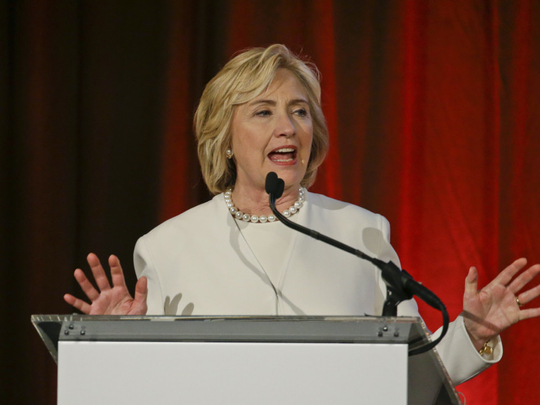
Hillary Clinton has picked up one of the few remaining major endorsements available to Democrats: The blessing of the Service Employees International Union. As Politico reports: “Clinton now has the support of unions representing about 9.5 million union members, or nearly two-thirds of the US’ 14.6 million union workers.”
Bernie Sanders’s slim hopes of rallying just got slimmer. It’s hard to see how a challenge from the left can succeed if it can’t grab support from unions, notably from one that endorsed Hillary’s opponent, Barack Obama, in 2008.
This “is the latest sign of her tightened grip on the party,” as Jonathan Martin of the New York Times pointed out on Twitter — a grip she has held since January 2015, in fact.
But the opposite could be true as well: The party has tightened its hold on Hillary Clinton. We tend to think of nomination politics as a game in which the players are the candidates. But those players could just as well be the party actors — the politicians, campaign and governing professionals, formal party officials and staff, donors and activists, party-aligned interest groups and the partisan press. These people work hard to control the party.
How can we tell which story is more important: “Hillary controls” or “party controls”?
First, we should look at what candidates do to win the nomination. Hillary’s positions on the issues could not be more perfectly aligned with those of most party actors. That is true even on banking policy, where her position has been challenged by Sanders and where she has a history that might have caused problems. She moved sharply to stake out what party actors would consider a strong position.
In other areas, little daylight exists between Hillary and the party consensus, whether it is national security, reproductive rights, guns, taxes, civil rights, campaign finance ... you name it. Democratic voters may disagree on some of these things (yes, there are pro-life Democrats, for example, just as there are pro-choice Republicans). But where party actors agree on something, that’s where you’ll find Hillary.
And then we can see how candidates act when they make it into office. The promises they make on the campaign trail constrain them in office. So what Hillary has said to win the nomination will make her loyal to the party if she winds up winning in November 2016.
We can see that in the people who run presidential campaigns and then wind up working for the White House, if their candidate wins. Strong ties to the party network are common. If we think more of a Hillary candidacy, rather than of Hillary Clinton the candidate, then we can see how the party has deep roots in most major campaigns.
Of course, from Hillary’s point of view, it matters a lot whether she or some other candidate winds up in the Oval Office in 2017. But for the rest of us? Once we know what party wins, we’ll know what the party’s consensus is — or, if two factions fight it out, we’ll know which one wins. The candidate isn’t as important as the party.
— Washington Post









